Leadership and Effecting Change in Public Health: A PUBH6004 Report
VerifiedAdded on 2023/06/10
|11
|3005
|250
Report
AI Summary
This report, prepared by a student for the PUBH6004 course, examines the multifaceted aspects of leadership and effecting change within the public health domain. The report commences with an analysis of a specific scenario, focusing on the challenges faced by a public health leader, and explores the importance of understanding systemic problems, setting new directions, and learning from past mistakes. The report then delves into a self-assessment component, evaluating the student's personal leadership strengths and weaknesses, including their ability to engage with others, establish goals, and demonstrate self-awareness. The assessment highlights areas for improvement, such as managing reclusive tendencies and improving communication under pressure. Finally, the report concludes with a reflective section, outlining the student's preferred leadership style and its practical application within the context of the scenario, with a focus on democratic leadership and collaborative decision-making. The student's reflection also identifies gaps and proposes an action plan to address them. The report emphasizes the importance of cultural competence, effective communication, and the ability to inspire others in fostering positive change within the community. The report also includes references to support the analysis and findings.
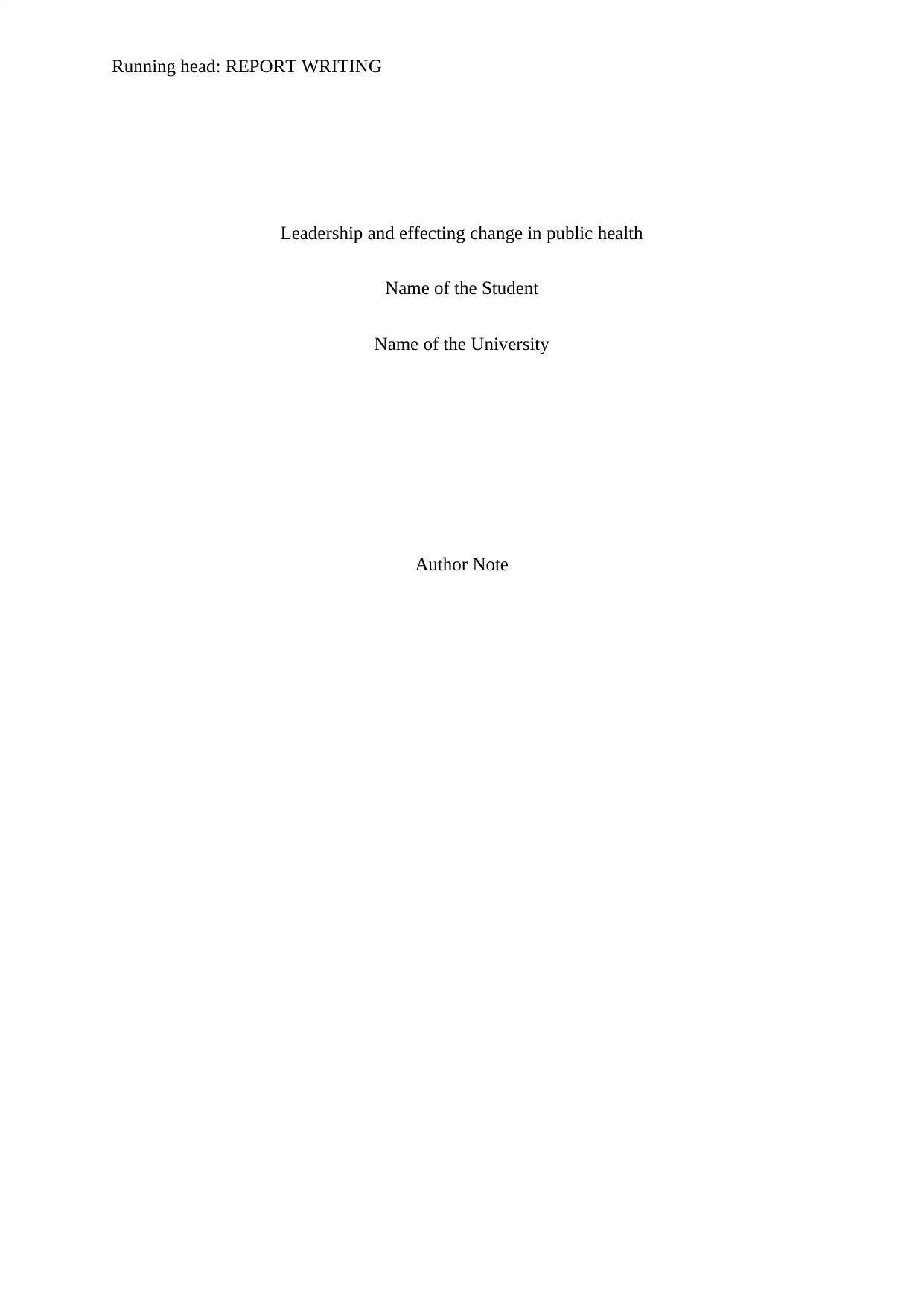
Running head: REPORT WRITING
Leadership and effecting change in public health
Name of the Student
Name of the University
Author Note
Leadership and effecting change in public health
Name of the Student
Name of the University
Author Note
Paraphrase This Document
Need a fresh take? Get an instant paraphrase of this document with our AI Paraphraser
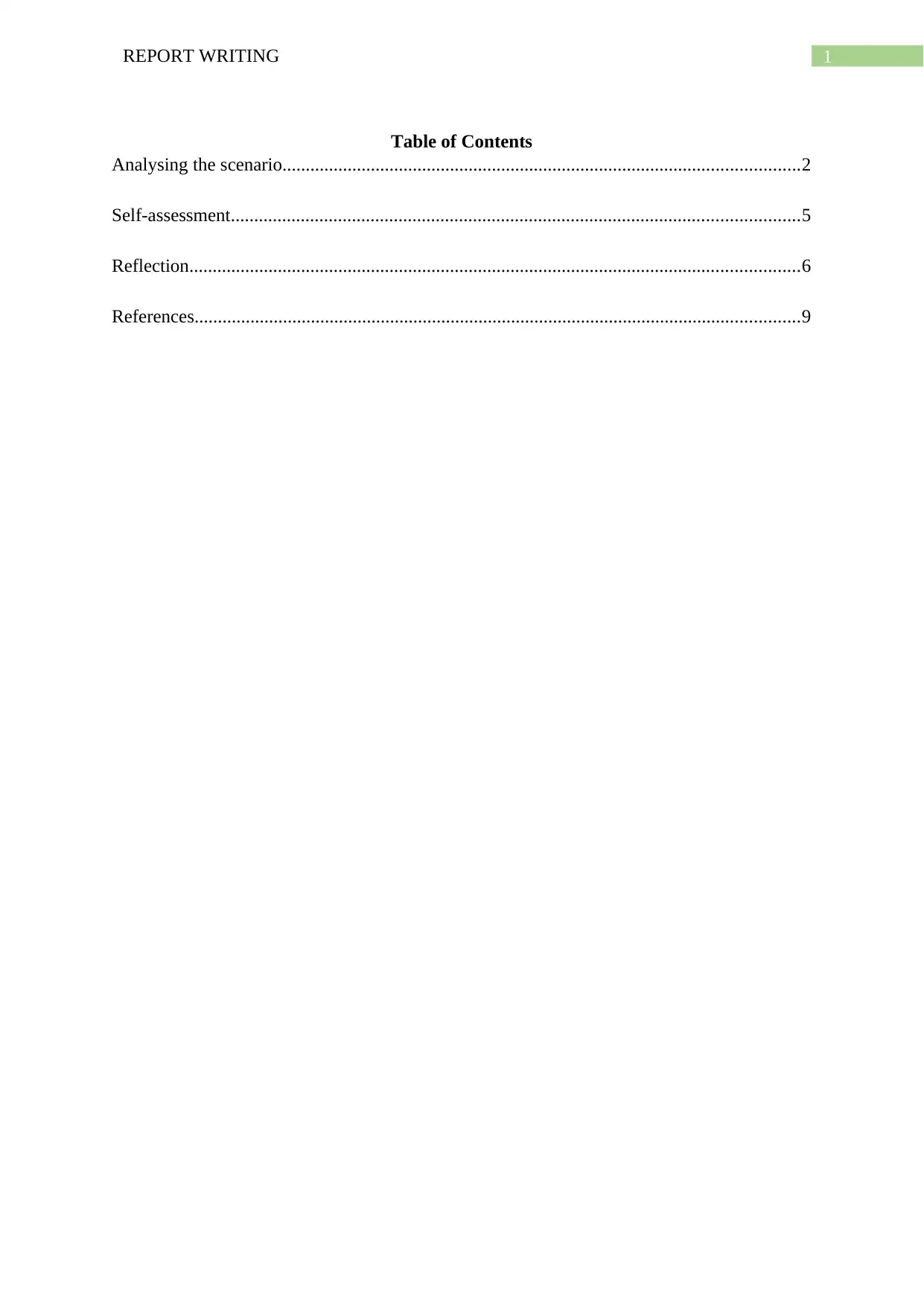
1REPORT WRITING
Table of Contents
Analysing the scenario...............................................................................................................2
Self-assessment..........................................................................................................................5
Reflection...................................................................................................................................6
References..................................................................................................................................9
Table of Contents
Analysing the scenario...............................................................................................................2
Self-assessment..........................................................................................................................5
Reflection...................................................................................................................................6
References..................................................................................................................................9
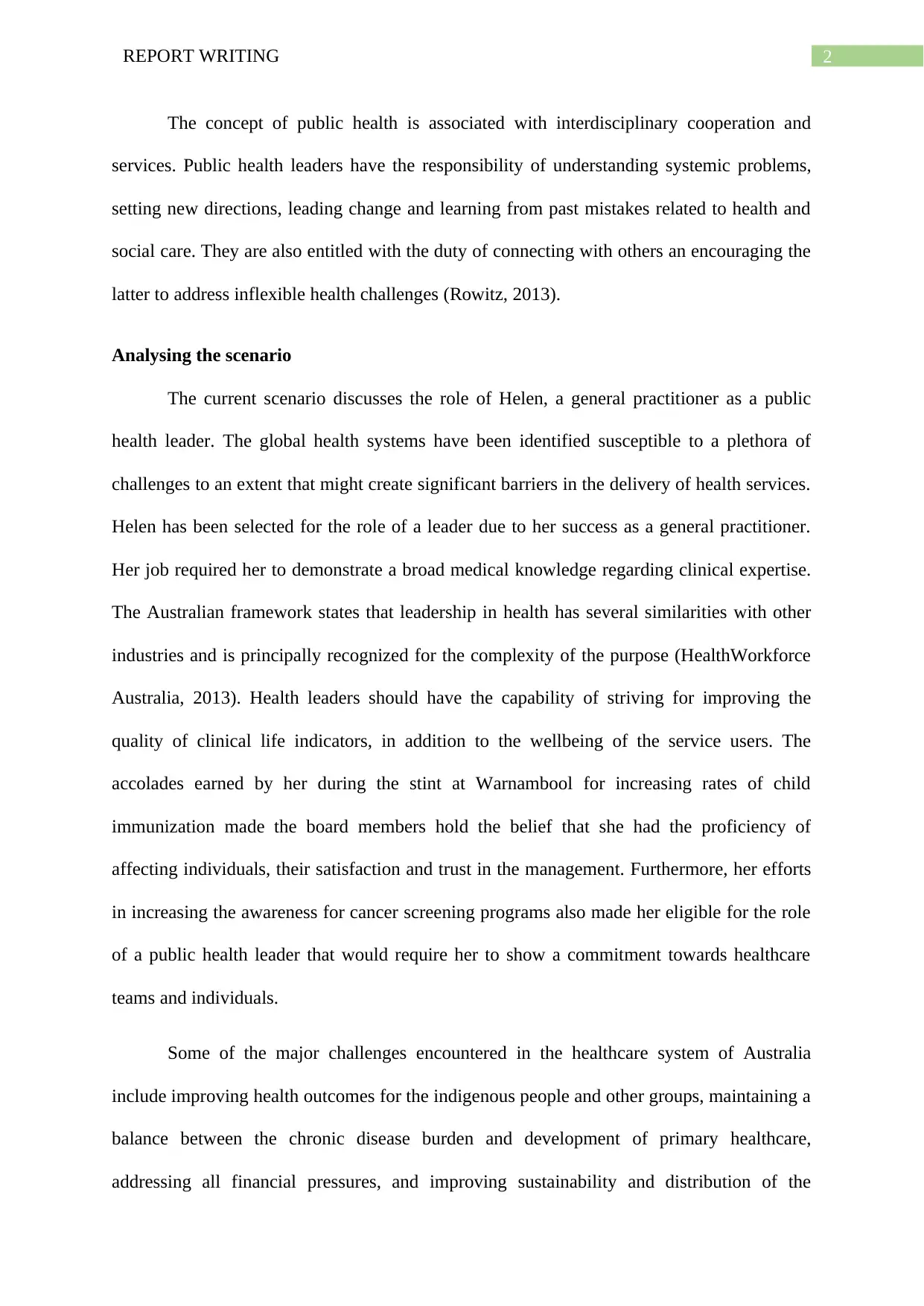
2REPORT WRITING
The concept of public health is associated with interdisciplinary cooperation and
services. Public health leaders have the responsibility of understanding systemic problems,
setting new directions, leading change and learning from past mistakes related to health and
social care. They are also entitled with the duty of connecting with others an encouraging the
latter to address inflexible health challenges (Rowitz, 2013).
Analysing the scenario
The current scenario discusses the role of Helen, a general practitioner as a public
health leader. The global health systems have been identified susceptible to a plethora of
challenges to an extent that might create significant barriers in the delivery of health services.
Helen has been selected for the role of a leader due to her success as a general practitioner.
Her job required her to demonstrate a broad medical knowledge regarding clinical expertise.
The Australian framework states that leadership in health has several similarities with other
industries and is principally recognized for the complexity of the purpose (HealthWorkforce
Australia, 2013). Health leaders should have the capability of striving for improving the
quality of clinical life indicators, in addition to the wellbeing of the service users. The
accolades earned by her during the stint at Warnambool for increasing rates of child
immunization made the board members hold the belief that she had the proficiency of
affecting individuals, their satisfaction and trust in the management. Furthermore, her efforts
in increasing the awareness for cancer screening programs also made her eligible for the role
of a public health leader that would require her to show a commitment towards healthcare
teams and individuals.
Some of the major challenges encountered in the healthcare system of Australia
include improving health outcomes for the indigenous people and other groups, maintaining a
balance between the chronic disease burden and development of primary healthcare,
addressing all financial pressures, and improving sustainability and distribution of the
The concept of public health is associated with interdisciplinary cooperation and
services. Public health leaders have the responsibility of understanding systemic problems,
setting new directions, leading change and learning from past mistakes related to health and
social care. They are also entitled with the duty of connecting with others an encouraging the
latter to address inflexible health challenges (Rowitz, 2013).
Analysing the scenario
The current scenario discusses the role of Helen, a general practitioner as a public
health leader. The global health systems have been identified susceptible to a plethora of
challenges to an extent that might create significant barriers in the delivery of health services.
Helen has been selected for the role of a leader due to her success as a general practitioner.
Her job required her to demonstrate a broad medical knowledge regarding clinical expertise.
The Australian framework states that leadership in health has several similarities with other
industries and is principally recognized for the complexity of the purpose (HealthWorkforce
Australia, 2013). Health leaders should have the capability of striving for improving the
quality of clinical life indicators, in addition to the wellbeing of the service users. The
accolades earned by her during the stint at Warnambool for increasing rates of child
immunization made the board members hold the belief that she had the proficiency of
affecting individuals, their satisfaction and trust in the management. Furthermore, her efforts
in increasing the awareness for cancer screening programs also made her eligible for the role
of a public health leader that would require her to show a commitment towards healthcare
teams and individuals.
Some of the major challenges encountered in the healthcare system of Australia
include improving health outcomes for the indigenous people and other groups, maintaining a
balance between the chronic disease burden and development of primary healthcare,
addressing all financial pressures, and improving sustainability and distribution of the
⊘ This is a preview!⊘
Do you want full access?
Subscribe today to unlock all pages.

Trusted by 1+ million students worldwide
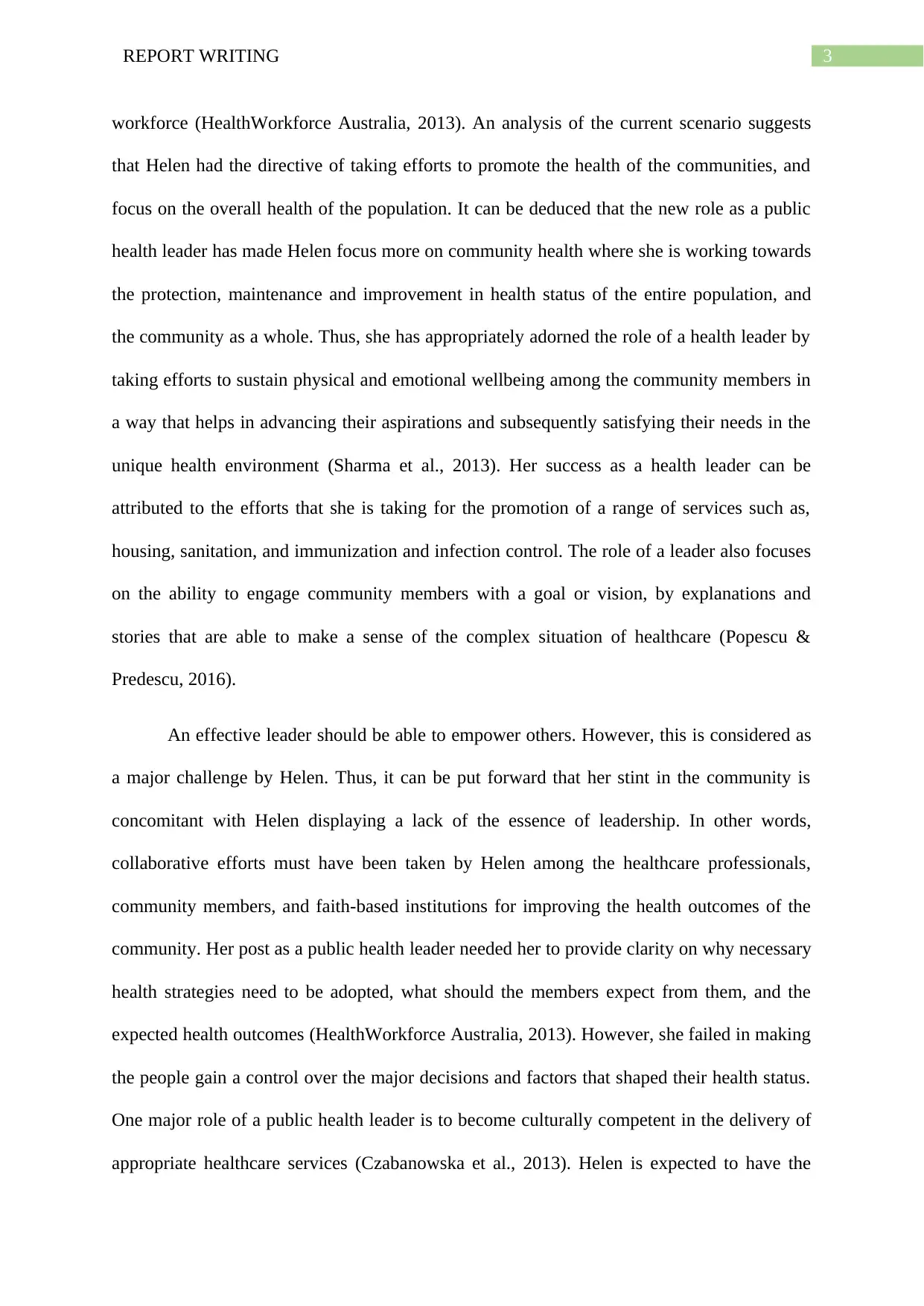
3REPORT WRITING
workforce (HealthWorkforce Australia, 2013). An analysis of the current scenario suggests
that Helen had the directive of taking efforts to promote the health of the communities, and
focus on the overall health of the population. It can be deduced that the new role as a public
health leader has made Helen focus more on community health where she is working towards
the protection, maintenance and improvement in health status of the entire population, and
the community as a whole. Thus, she has appropriately adorned the role of a health leader by
taking efforts to sustain physical and emotional wellbeing among the community members in
a way that helps in advancing their aspirations and subsequently satisfying their needs in the
unique health environment (Sharma et al., 2013). Her success as a health leader can be
attributed to the efforts that she is taking for the promotion of a range of services such as,
housing, sanitation, and immunization and infection control. The role of a leader also focuses
on the ability to engage community members with a goal or vision, by explanations and
stories that are able to make a sense of the complex situation of healthcare (Popescu &
Predescu, 2016).
An effective leader should be able to empower others. However, this is considered as
a major challenge by Helen. Thus, it can be put forward that her stint in the community is
concomitant with Helen displaying a lack of the essence of leadership. In other words,
collaborative efforts must have been taken by Helen among the healthcare professionals,
community members, and faith-based institutions for improving the health outcomes of the
community. Her post as a public health leader needed her to provide clarity on why necessary
health strategies need to be adopted, what should the members expect from them, and the
expected health outcomes (HealthWorkforce Australia, 2013). However, she failed in making
the people gain a control over the major decisions and factors that shaped their health status.
One major role of a public health leader is to become culturally competent in the delivery of
appropriate healthcare services (Czabanowska et al., 2013). Helen is expected to have the
workforce (HealthWorkforce Australia, 2013). An analysis of the current scenario suggests
that Helen had the directive of taking efforts to promote the health of the communities, and
focus on the overall health of the population. It can be deduced that the new role as a public
health leader has made Helen focus more on community health where she is working towards
the protection, maintenance and improvement in health status of the entire population, and
the community as a whole. Thus, she has appropriately adorned the role of a health leader by
taking efforts to sustain physical and emotional wellbeing among the community members in
a way that helps in advancing their aspirations and subsequently satisfying their needs in the
unique health environment (Sharma et al., 2013). Her success as a health leader can be
attributed to the efforts that she is taking for the promotion of a range of services such as,
housing, sanitation, and immunization and infection control. The role of a leader also focuses
on the ability to engage community members with a goal or vision, by explanations and
stories that are able to make a sense of the complex situation of healthcare (Popescu &
Predescu, 2016).
An effective leader should be able to empower others. However, this is considered as
a major challenge by Helen. Thus, it can be put forward that her stint in the community is
concomitant with Helen displaying a lack of the essence of leadership. In other words,
collaborative efforts must have been taken by Helen among the healthcare professionals,
community members, and faith-based institutions for improving the health outcomes of the
community. Her post as a public health leader needed her to provide clarity on why necessary
health strategies need to be adopted, what should the members expect from them, and the
expected health outcomes (HealthWorkforce Australia, 2013). However, she failed in making
the people gain a control over the major decisions and factors that shaped their health status.
One major role of a public health leader is to become culturally competent in the delivery of
appropriate healthcare services (Czabanowska et al., 2013). Helen is expected to have the
Paraphrase This Document
Need a fresh take? Get an instant paraphrase of this document with our AI Paraphraser
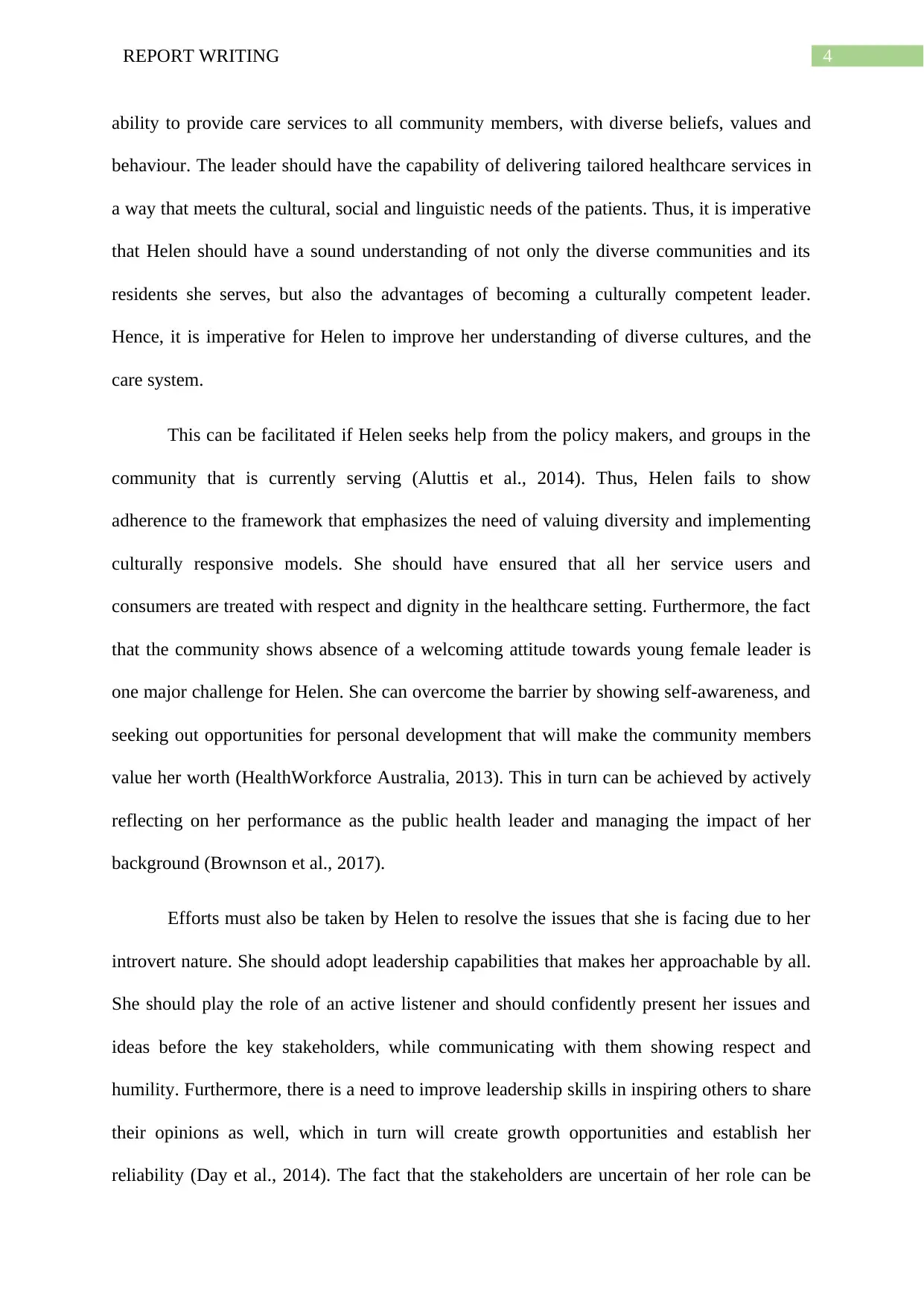
4REPORT WRITING
ability to provide care services to all community members, with diverse beliefs, values and
behaviour. The leader should have the capability of delivering tailored healthcare services in
a way that meets the cultural, social and linguistic needs of the patients. Thus, it is imperative
that Helen should have a sound understanding of not only the diverse communities and its
residents she serves, but also the advantages of becoming a culturally competent leader.
Hence, it is imperative for Helen to improve her understanding of diverse cultures, and the
care system.
This can be facilitated if Helen seeks help from the policy makers, and groups in the
community that is currently serving (Aluttis et al., 2014). Thus, Helen fails to show
adherence to the framework that emphasizes the need of valuing diversity and implementing
culturally responsive models. She should have ensured that all her service users and
consumers are treated with respect and dignity in the healthcare setting. Furthermore, the fact
that the community shows absence of a welcoming attitude towards young female leader is
one major challenge for Helen. She can overcome the barrier by showing self-awareness, and
seeking out opportunities for personal development that will make the community members
value her worth (HealthWorkforce Australia, 2013). This in turn can be achieved by actively
reflecting on her performance as the public health leader and managing the impact of her
background (Brownson et al., 2017).
Efforts must also be taken by Helen to resolve the issues that she is facing due to her
introvert nature. She should adopt leadership capabilities that makes her approachable by all.
She should play the role of an active listener and should confidently present her issues and
ideas before the key stakeholders, while communicating with them showing respect and
humility. Furthermore, there is a need to improve leadership skills in inspiring others to share
their opinions as well, which in turn will create growth opportunities and establish her
reliability (Day et al., 2014). The fact that the stakeholders are uncertain of her role can be
ability to provide care services to all community members, with diverse beliefs, values and
behaviour. The leader should have the capability of delivering tailored healthcare services in
a way that meets the cultural, social and linguistic needs of the patients. Thus, it is imperative
that Helen should have a sound understanding of not only the diverse communities and its
residents she serves, but also the advantages of becoming a culturally competent leader.
Hence, it is imperative for Helen to improve her understanding of diverse cultures, and the
care system.
This can be facilitated if Helen seeks help from the policy makers, and groups in the
community that is currently serving (Aluttis et al., 2014). Thus, Helen fails to show
adherence to the framework that emphasizes the need of valuing diversity and implementing
culturally responsive models. She should have ensured that all her service users and
consumers are treated with respect and dignity in the healthcare setting. Furthermore, the fact
that the community shows absence of a welcoming attitude towards young female leader is
one major challenge for Helen. She can overcome the barrier by showing self-awareness, and
seeking out opportunities for personal development that will make the community members
value her worth (HealthWorkforce Australia, 2013). This in turn can be achieved by actively
reflecting on her performance as the public health leader and managing the impact of her
background (Brownson et al., 2017).
Efforts must also be taken by Helen to resolve the issues that she is facing due to her
introvert nature. She should adopt leadership capabilities that makes her approachable by all.
She should play the role of an active listener and should confidently present her issues and
ideas before the key stakeholders, while communicating with them showing respect and
humility. Furthermore, there is a need to improve leadership skills in inspiring others to share
their opinions as well, which in turn will create growth opportunities and establish her
reliability (Day et al., 2014). The fact that the stakeholders are uncertain of her role can be
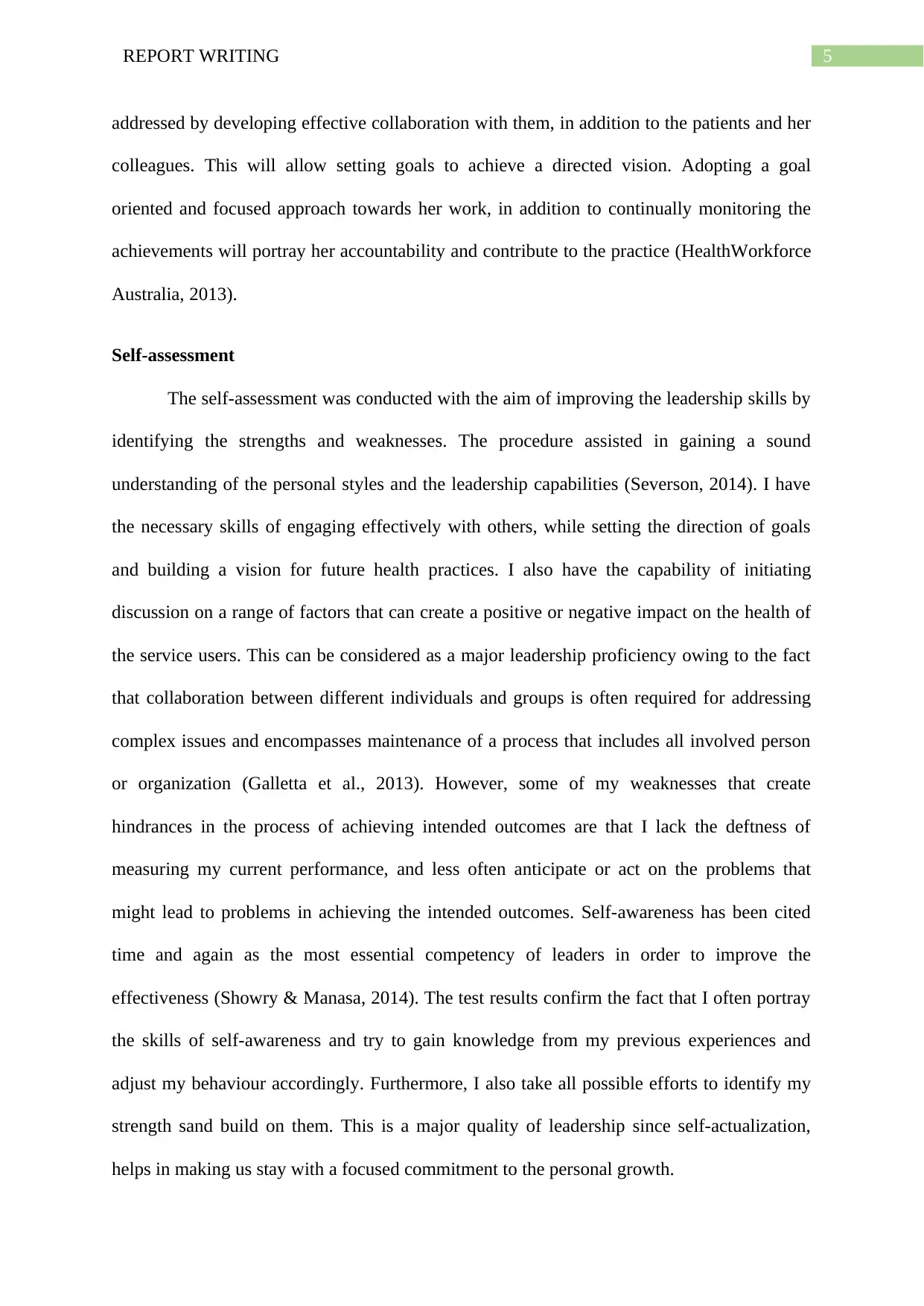
5REPORT WRITING
addressed by developing effective collaboration with them, in addition to the patients and her
colleagues. This will allow setting goals to achieve a directed vision. Adopting a goal
oriented and focused approach towards her work, in addition to continually monitoring the
achievements will portray her accountability and contribute to the practice (HealthWorkforce
Australia, 2013).
Self-assessment
The self-assessment was conducted with the aim of improving the leadership skills by
identifying the strengths and weaknesses. The procedure assisted in gaining a sound
understanding of the personal styles and the leadership capabilities (Severson, 2014). I have
the necessary skills of engaging effectively with others, while setting the direction of goals
and building a vision for future health practices. I also have the capability of initiating
discussion on a range of factors that can create a positive or negative impact on the health of
the service users. This can be considered as a major leadership proficiency owing to the fact
that collaboration between different individuals and groups is often required for addressing
complex issues and encompasses maintenance of a process that includes all involved person
or organization (Galletta et al., 2013). However, some of my weaknesses that create
hindrances in the process of achieving intended outcomes are that I lack the deftness of
measuring my current performance, and less often anticipate or act on the problems that
might lead to problems in achieving the intended outcomes. Self-awareness has been cited
time and again as the most essential competency of leaders in order to improve the
effectiveness (Showry & Manasa, 2014). The test results confirm the fact that I often portray
the skills of self-awareness and try to gain knowledge from my previous experiences and
adjust my behaviour accordingly. Furthermore, I also take all possible efforts to identify my
strength sand build on them. This is a major quality of leadership since self-actualization,
helps in making us stay with a focused commitment to the personal growth.
addressed by developing effective collaboration with them, in addition to the patients and her
colleagues. This will allow setting goals to achieve a directed vision. Adopting a goal
oriented and focused approach towards her work, in addition to continually monitoring the
achievements will portray her accountability and contribute to the practice (HealthWorkforce
Australia, 2013).
Self-assessment
The self-assessment was conducted with the aim of improving the leadership skills by
identifying the strengths and weaknesses. The procedure assisted in gaining a sound
understanding of the personal styles and the leadership capabilities (Severson, 2014). I have
the necessary skills of engaging effectively with others, while setting the direction of goals
and building a vision for future health practices. I also have the capability of initiating
discussion on a range of factors that can create a positive or negative impact on the health of
the service users. This can be considered as a major leadership proficiency owing to the fact
that collaboration between different individuals and groups is often required for addressing
complex issues and encompasses maintenance of a process that includes all involved person
or organization (Galletta et al., 2013). However, some of my weaknesses that create
hindrances in the process of achieving intended outcomes are that I lack the deftness of
measuring my current performance, and less often anticipate or act on the problems that
might lead to problems in achieving the intended outcomes. Self-awareness has been cited
time and again as the most essential competency of leaders in order to improve the
effectiveness (Showry & Manasa, 2014). The test results confirm the fact that I often portray
the skills of self-awareness and try to gain knowledge from my previous experiences and
adjust my behaviour accordingly. Furthermore, I also take all possible efforts to identify my
strength sand build on them. This is a major quality of leadership since self-actualization,
helps in making us stay with a focused commitment to the personal growth.
⊘ This is a preview!⊘
Do you want full access?
Subscribe today to unlock all pages.

Trusted by 1+ million students worldwide
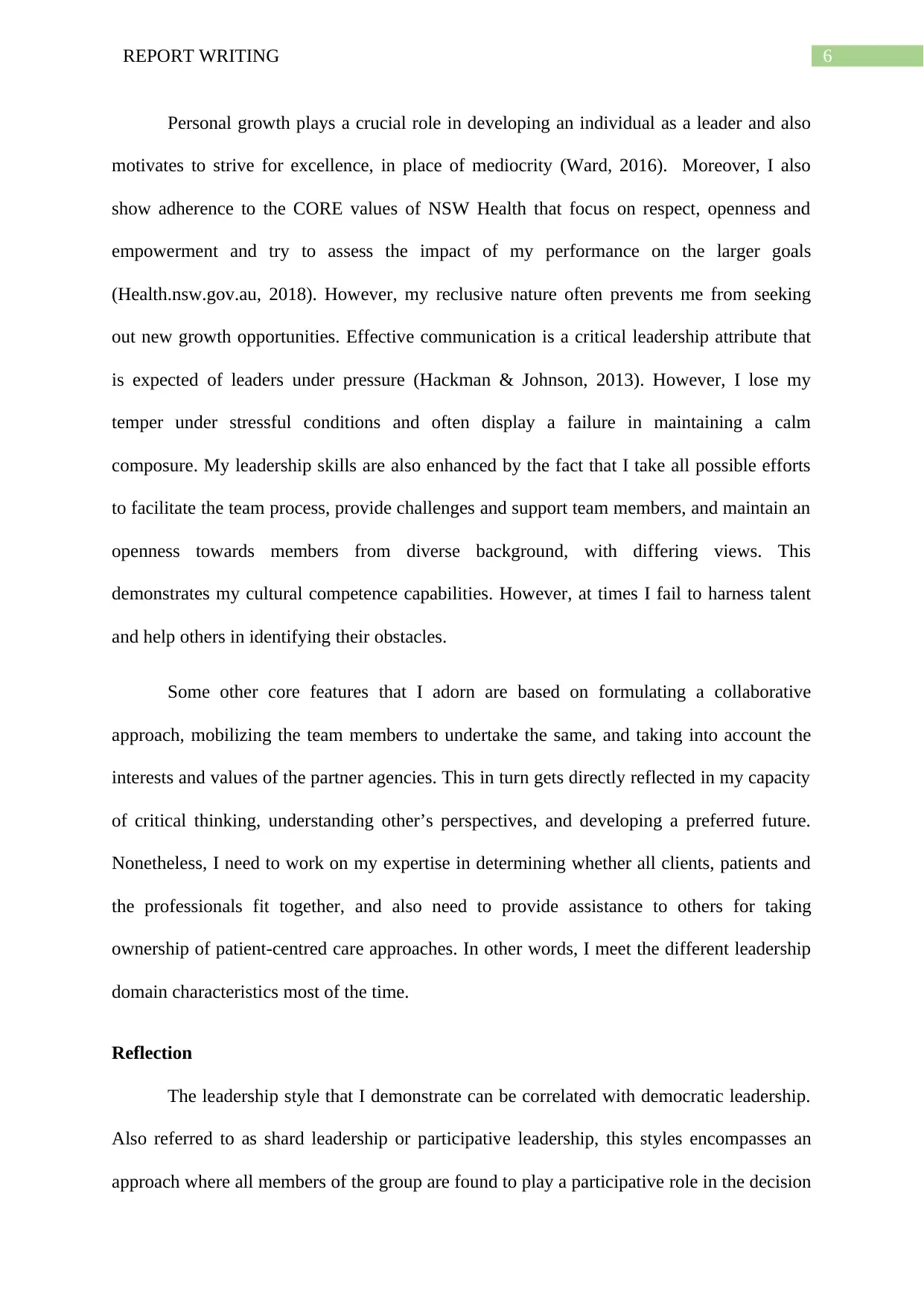
6REPORT WRITING
Personal growth plays a crucial role in developing an individual as a leader and also
motivates to strive for excellence, in place of mediocrity (Ward, 2016). Moreover, I also
show adherence to the CORE values of NSW Health that focus on respect, openness and
empowerment and try to assess the impact of my performance on the larger goals
(Health.nsw.gov.au, 2018). However, my reclusive nature often prevents me from seeking
out new growth opportunities. Effective communication is a critical leadership attribute that
is expected of leaders under pressure (Hackman & Johnson, 2013). However, I lose my
temper under stressful conditions and often display a failure in maintaining a calm
composure. My leadership skills are also enhanced by the fact that I take all possible efforts
to facilitate the team process, provide challenges and support team members, and maintain an
openness towards members from diverse background, with differing views. This
demonstrates my cultural competence capabilities. However, at times I fail to harness talent
and help others in identifying their obstacles.
Some other core features that I adorn are based on formulating a collaborative
approach, mobilizing the team members to undertake the same, and taking into account the
interests and values of the partner agencies. This in turn gets directly reflected in my capacity
of critical thinking, understanding other’s perspectives, and developing a preferred future.
Nonetheless, I need to work on my expertise in determining whether all clients, patients and
the professionals fit together, and also need to provide assistance to others for taking
ownership of patient-centred care approaches. In other words, I meet the different leadership
domain characteristics most of the time.
Reflection
The leadership style that I demonstrate can be correlated with democratic leadership.
Also referred to as shard leadership or participative leadership, this styles encompasses an
approach where all members of the group are found to play a participative role in the decision
Personal growth plays a crucial role in developing an individual as a leader and also
motivates to strive for excellence, in place of mediocrity (Ward, 2016). Moreover, I also
show adherence to the CORE values of NSW Health that focus on respect, openness and
empowerment and try to assess the impact of my performance on the larger goals
(Health.nsw.gov.au, 2018). However, my reclusive nature often prevents me from seeking
out new growth opportunities. Effective communication is a critical leadership attribute that
is expected of leaders under pressure (Hackman & Johnson, 2013). However, I lose my
temper under stressful conditions and often display a failure in maintaining a calm
composure. My leadership skills are also enhanced by the fact that I take all possible efforts
to facilitate the team process, provide challenges and support team members, and maintain an
openness towards members from diverse background, with differing views. This
demonstrates my cultural competence capabilities. However, at times I fail to harness talent
and help others in identifying their obstacles.
Some other core features that I adorn are based on formulating a collaborative
approach, mobilizing the team members to undertake the same, and taking into account the
interests and values of the partner agencies. This in turn gets directly reflected in my capacity
of critical thinking, understanding other’s perspectives, and developing a preferred future.
Nonetheless, I need to work on my expertise in determining whether all clients, patients and
the professionals fit together, and also need to provide assistance to others for taking
ownership of patient-centred care approaches. In other words, I meet the different leadership
domain characteristics most of the time.
Reflection
The leadership style that I demonstrate can be correlated with democratic leadership.
Also referred to as shard leadership or participative leadership, this styles encompasses an
approach where all members of the group are found to play a participative role in the decision
Paraphrase This Document
Need a fresh take? Get an instant paraphrase of this document with our AI Paraphraser
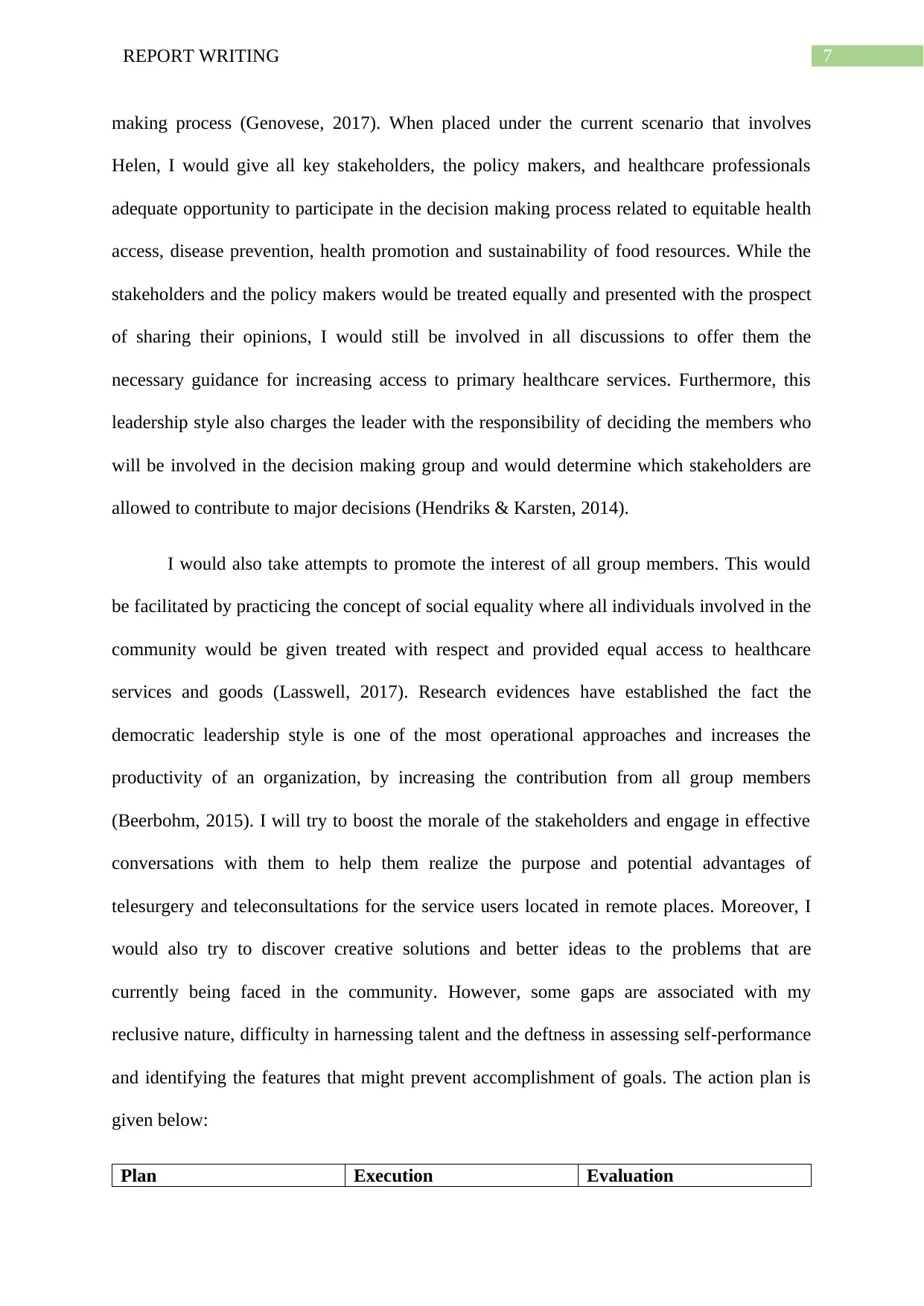
7REPORT WRITING
making process (Genovese, 2017). When placed under the current scenario that involves
Helen, I would give all key stakeholders, the policy makers, and healthcare professionals
adequate opportunity to participate in the decision making process related to equitable health
access, disease prevention, health promotion and sustainability of food resources. While the
stakeholders and the policy makers would be treated equally and presented with the prospect
of sharing their opinions, I would still be involved in all discussions to offer them the
necessary guidance for increasing access to primary healthcare services. Furthermore, this
leadership style also charges the leader with the responsibility of deciding the members who
will be involved in the decision making group and would determine which stakeholders are
allowed to contribute to major decisions (Hendriks & Karsten, 2014).
I would also take attempts to promote the interest of all group members. This would
be facilitated by practicing the concept of social equality where all individuals involved in the
community would be given treated with respect and provided equal access to healthcare
services and goods (Lasswell, 2017). Research evidences have established the fact the
democratic leadership style is one of the most operational approaches and increases the
productivity of an organization, by increasing the contribution from all group members
(Beerbohm, 2015). I will try to boost the morale of the stakeholders and engage in effective
conversations with them to help them realize the purpose and potential advantages of
telesurgery and teleconsultations for the service users located in remote places. Moreover, I
would also try to discover creative solutions and better ideas to the problems that are
currently being faced in the community. However, some gaps are associated with my
reclusive nature, difficulty in harnessing talent and the deftness in assessing self-performance
and identifying the features that might prevent accomplishment of goals. The action plan is
given below:
Plan Execution Evaluation
making process (Genovese, 2017). When placed under the current scenario that involves
Helen, I would give all key stakeholders, the policy makers, and healthcare professionals
adequate opportunity to participate in the decision making process related to equitable health
access, disease prevention, health promotion and sustainability of food resources. While the
stakeholders and the policy makers would be treated equally and presented with the prospect
of sharing their opinions, I would still be involved in all discussions to offer them the
necessary guidance for increasing access to primary healthcare services. Furthermore, this
leadership style also charges the leader with the responsibility of deciding the members who
will be involved in the decision making group and would determine which stakeholders are
allowed to contribute to major decisions (Hendriks & Karsten, 2014).
I would also take attempts to promote the interest of all group members. This would
be facilitated by practicing the concept of social equality where all individuals involved in the
community would be given treated with respect and provided equal access to healthcare
services and goods (Lasswell, 2017). Research evidences have established the fact the
democratic leadership style is one of the most operational approaches and increases the
productivity of an organization, by increasing the contribution from all group members
(Beerbohm, 2015). I will try to boost the morale of the stakeholders and engage in effective
conversations with them to help them realize the purpose and potential advantages of
telesurgery and teleconsultations for the service users located in remote places. Moreover, I
would also try to discover creative solutions and better ideas to the problems that are
currently being faced in the community. However, some gaps are associated with my
reclusive nature, difficulty in harnessing talent and the deftness in assessing self-performance
and identifying the features that might prevent accomplishment of goals. The action plan is
given below:
Plan Execution Evaluation
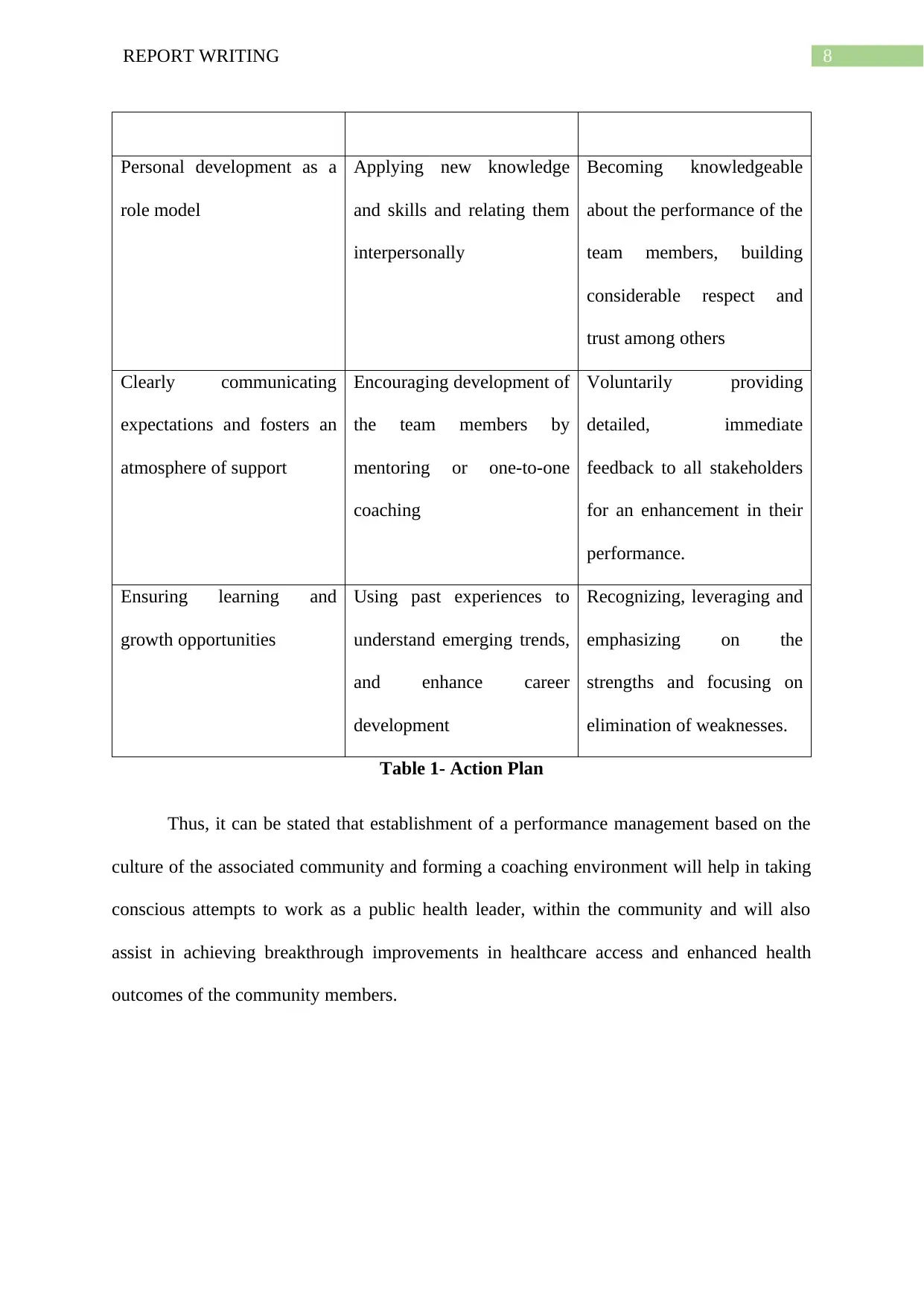
8REPORT WRITING
Personal development as a
role model
Applying new knowledge
and skills and relating them
interpersonally
Becoming knowledgeable
about the performance of the
team members, building
considerable respect and
trust among others
Clearly communicating
expectations and fosters an
atmosphere of support
Encouraging development of
the team members by
mentoring or one-to-one
coaching
Voluntarily providing
detailed, immediate
feedback to all stakeholders
for an enhancement in their
performance.
Ensuring learning and
growth opportunities
Using past experiences to
understand emerging trends,
and enhance career
development
Recognizing, leveraging and
emphasizing on the
strengths and focusing on
elimination of weaknesses.
Table 1- Action Plan
Thus, it can be stated that establishment of a performance management based on the
culture of the associated community and forming a coaching environment will help in taking
conscious attempts to work as a public health leader, within the community and will also
assist in achieving breakthrough improvements in healthcare access and enhanced health
outcomes of the community members.
Personal development as a
role model
Applying new knowledge
and skills and relating them
interpersonally
Becoming knowledgeable
about the performance of the
team members, building
considerable respect and
trust among others
Clearly communicating
expectations and fosters an
atmosphere of support
Encouraging development of
the team members by
mentoring or one-to-one
coaching
Voluntarily providing
detailed, immediate
feedback to all stakeholders
for an enhancement in their
performance.
Ensuring learning and
growth opportunities
Using past experiences to
understand emerging trends,
and enhance career
development
Recognizing, leveraging and
emphasizing on the
strengths and focusing on
elimination of weaknesses.
Table 1- Action Plan
Thus, it can be stated that establishment of a performance management based on the
culture of the associated community and forming a coaching environment will help in taking
conscious attempts to work as a public health leader, within the community and will also
assist in achieving breakthrough improvements in healthcare access and enhanced health
outcomes of the community members.
⊘ This is a preview!⊘
Do you want full access?
Subscribe today to unlock all pages.

Trusted by 1+ million students worldwide
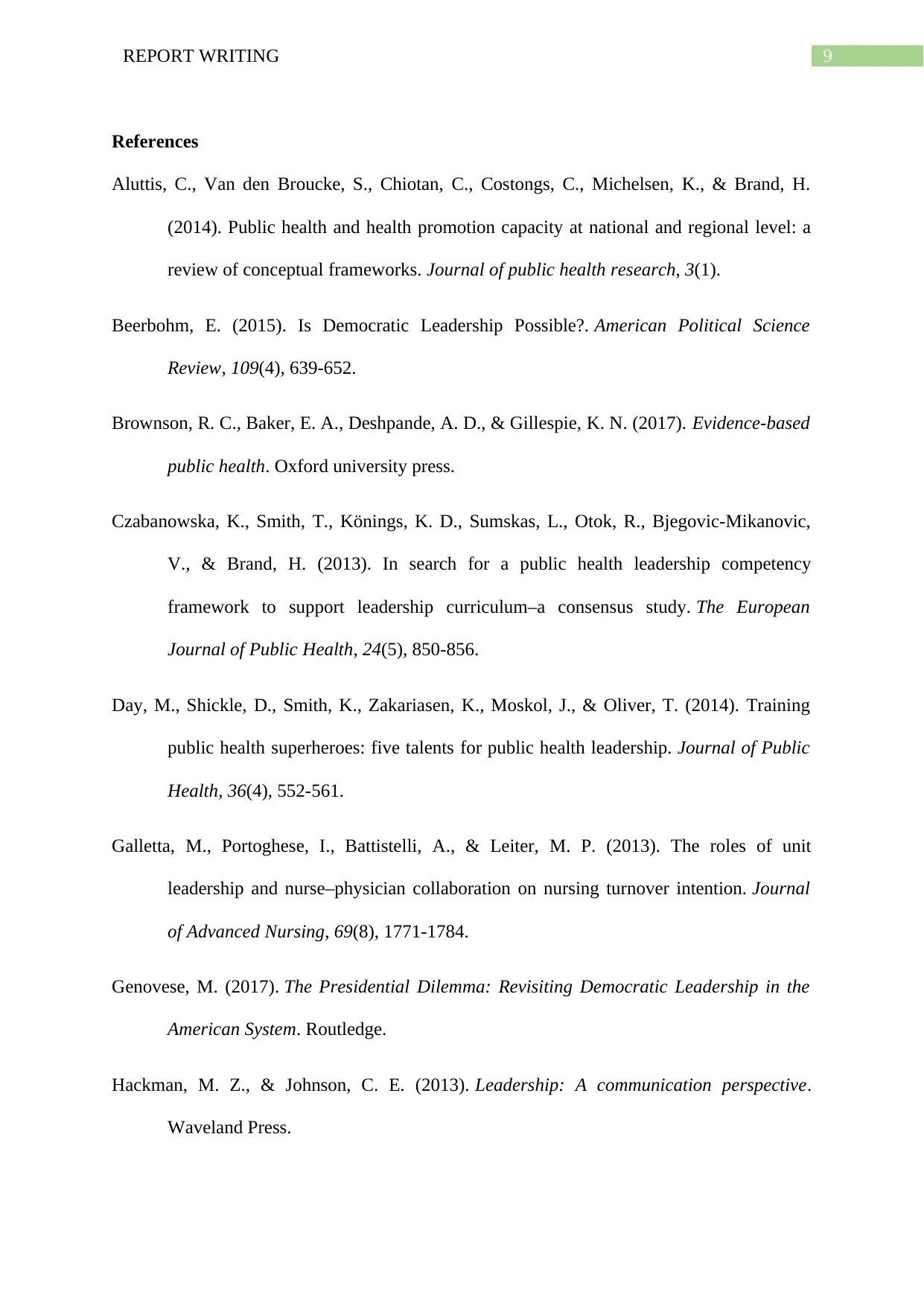
9REPORT WRITING
References
Aluttis, C., Van den Broucke, S., Chiotan, C., Costongs, C., Michelsen, K., & Brand, H.
(2014). Public health and health promotion capacity at national and regional level: a
review of conceptual frameworks. Journal of public health research, 3(1).
Beerbohm, E. (2015). Is Democratic Leadership Possible?. American Political Science
Review, 109(4), 639-652.
Brownson, R. C., Baker, E. A., Deshpande, A. D., & Gillespie, K. N. (2017). Evidence-based
public health. Oxford university press.
Czabanowska, K., Smith, T., Könings, K. D., Sumskas, L., Otok, R., Bjegovic-Mikanovic,
V., & Brand, H. (2013). In search for a public health leadership competency
framework to support leadership curriculum–a consensus study. The European
Journal of Public Health, 24(5), 850-856.
Day, M., Shickle, D., Smith, K., Zakariasen, K., Moskol, J., & Oliver, T. (2014). Training
public health superheroes: five talents for public health leadership. Journal of Public
Health, 36(4), 552-561.
Galletta, M., Portoghese, I., Battistelli, A., & Leiter, M. P. (2013). The roles of unit
leadership and nurse–physician collaboration on nursing turnover intention. Journal
of Advanced Nursing, 69(8), 1771-1784.
Genovese, M. (2017). The Presidential Dilemma: Revisiting Democratic Leadership in the
American System. Routledge.
Hackman, M. Z., & Johnson, C. E. (2013). Leadership: A communication perspective.
Waveland Press.
References
Aluttis, C., Van den Broucke, S., Chiotan, C., Costongs, C., Michelsen, K., & Brand, H.
(2014). Public health and health promotion capacity at national and regional level: a
review of conceptual frameworks. Journal of public health research, 3(1).
Beerbohm, E. (2015). Is Democratic Leadership Possible?. American Political Science
Review, 109(4), 639-652.
Brownson, R. C., Baker, E. A., Deshpande, A. D., & Gillespie, K. N. (2017). Evidence-based
public health. Oxford university press.
Czabanowska, K., Smith, T., Könings, K. D., Sumskas, L., Otok, R., Bjegovic-Mikanovic,
V., & Brand, H. (2013). In search for a public health leadership competency
framework to support leadership curriculum–a consensus study. The European
Journal of Public Health, 24(5), 850-856.
Day, M., Shickle, D., Smith, K., Zakariasen, K., Moskol, J., & Oliver, T. (2014). Training
public health superheroes: five talents for public health leadership. Journal of Public
Health, 36(4), 552-561.
Galletta, M., Portoghese, I., Battistelli, A., & Leiter, M. P. (2013). The roles of unit
leadership and nurse–physician collaboration on nursing turnover intention. Journal
of Advanced Nursing, 69(8), 1771-1784.
Genovese, M. (2017). The Presidential Dilemma: Revisiting Democratic Leadership in the
American System. Routledge.
Hackman, M. Z., & Johnson, C. E. (2013). Leadership: A communication perspective.
Waveland Press.
Paraphrase This Document
Need a fresh take? Get an instant paraphrase of this document with our AI Paraphraser
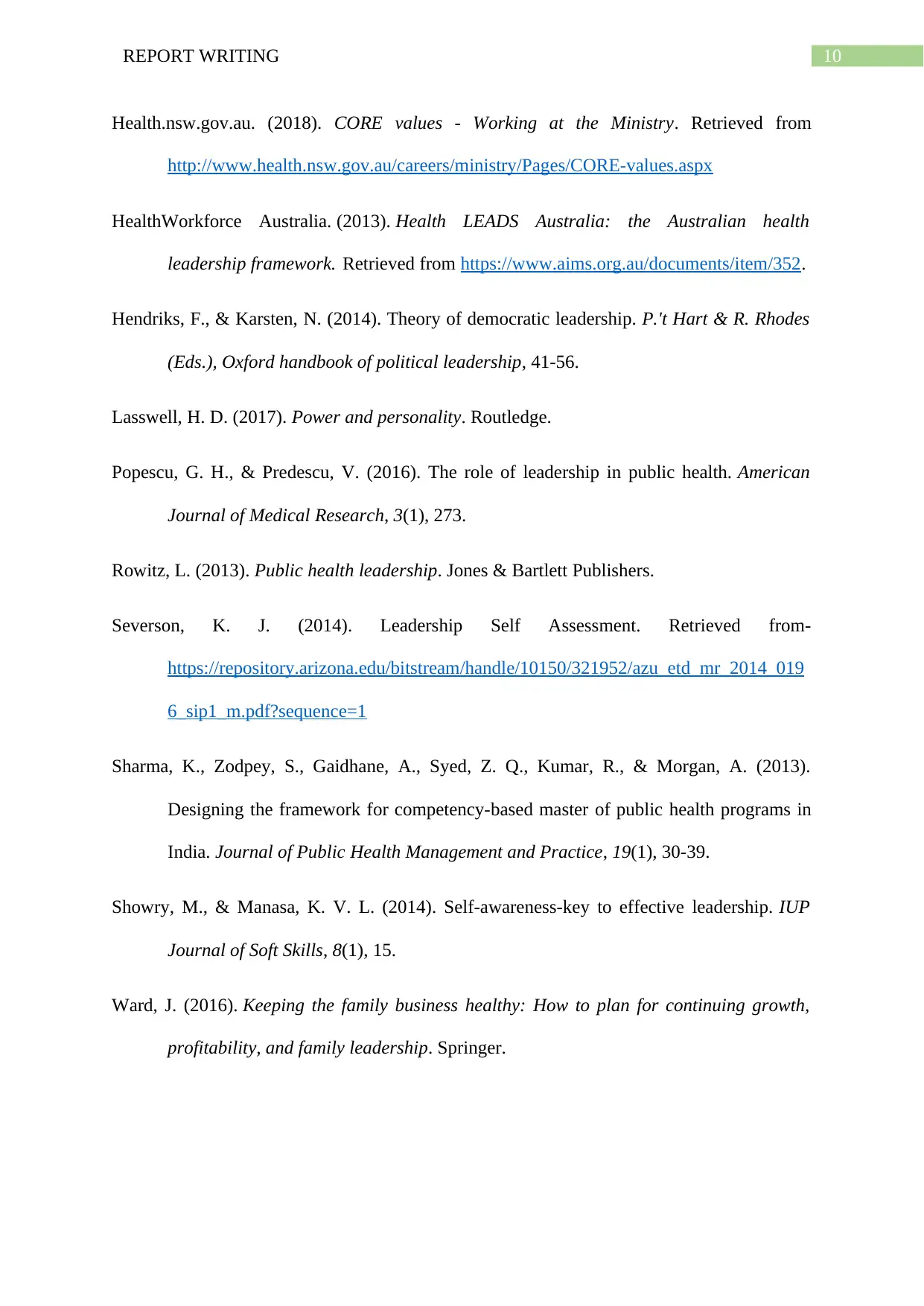
10REPORT WRITING
Health.nsw.gov.au. (2018). CORE values - Working at the Ministry. Retrieved from
http://www.health.nsw.gov.au/careers/ministry/Pages/CORE-values.aspx
HealthWorkforce Australia. (2013). Health LEADS Australia: the Australian health
leadership framework. Retrieved from https://www.aims.org.au/documents/item/352.
Hendriks, F., & Karsten, N. (2014). Theory of democratic leadership. P.'t Hart & R. Rhodes
(Eds.), Oxford handbook of political leadership, 41-56.
Lasswell, H. D. (2017). Power and personality. Routledge.
Popescu, G. H., & Predescu, V. (2016). The role of leadership in public health. American
Journal of Medical Research, 3(1), 273.
Rowitz, L. (2013). Public health leadership. Jones & Bartlett Publishers.
Severson, K. J. (2014). Leadership Self Assessment. Retrieved from-
https://repository.arizona.edu/bitstream/handle/10150/321952/azu_etd_mr_2014_019
6_sip1_m.pdf?sequence=1
Sharma, K., Zodpey, S., Gaidhane, A., Syed, Z. Q., Kumar, R., & Morgan, A. (2013).
Designing the framework for competency-based master of public health programs in
India. Journal of Public Health Management and Practice, 19(1), 30-39.
Showry, M., & Manasa, K. V. L. (2014). Self-awareness-key to effective leadership. IUP
Journal of Soft Skills, 8(1), 15.
Ward, J. (2016). Keeping the family business healthy: How to plan for continuing growth,
profitability, and family leadership. Springer.
Health.nsw.gov.au. (2018). CORE values - Working at the Ministry. Retrieved from
http://www.health.nsw.gov.au/careers/ministry/Pages/CORE-values.aspx
HealthWorkforce Australia. (2013). Health LEADS Australia: the Australian health
leadership framework. Retrieved from https://www.aims.org.au/documents/item/352.
Hendriks, F., & Karsten, N. (2014). Theory of democratic leadership. P.'t Hart & R. Rhodes
(Eds.), Oxford handbook of political leadership, 41-56.
Lasswell, H. D. (2017). Power and personality. Routledge.
Popescu, G. H., & Predescu, V. (2016). The role of leadership in public health. American
Journal of Medical Research, 3(1), 273.
Rowitz, L. (2013). Public health leadership. Jones & Bartlett Publishers.
Severson, K. J. (2014). Leadership Self Assessment. Retrieved from-
https://repository.arizona.edu/bitstream/handle/10150/321952/azu_etd_mr_2014_019
6_sip1_m.pdf?sequence=1
Sharma, K., Zodpey, S., Gaidhane, A., Syed, Z. Q., Kumar, R., & Morgan, A. (2013).
Designing the framework for competency-based master of public health programs in
India. Journal of Public Health Management and Practice, 19(1), 30-39.
Showry, M., & Manasa, K. V. L. (2014). Self-awareness-key to effective leadership. IUP
Journal of Soft Skills, 8(1), 15.
Ward, J. (2016). Keeping the family business healthy: How to plan for continuing growth,
profitability, and family leadership. Springer.
1 out of 11
Related Documents
Your All-in-One AI-Powered Toolkit for Academic Success.
+13062052269
info@desklib.com
Available 24*7 on WhatsApp / Email
![[object Object]](/_next/static/media/star-bottom.7253800d.svg)
Unlock your academic potential
Copyright © 2020–2026 A2Z Services. All Rights Reserved. Developed and managed by ZUCOL.





